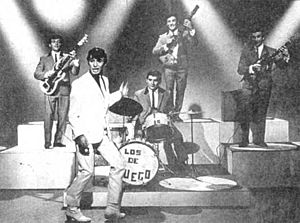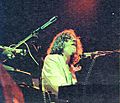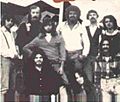Argentine rock facts for kids
Argentine rock is a type of rock music from Argentina. It's often called rock nacional, which means "national rock" in Spanish. Most of the songs are sung in Spanish.
Argentine rock started by playing popular English rock and roll songs. But by the late 1960s, Argentine musicians began writing their own songs in Spanish. These new songs talked about local life and culture. Since then, Argentine rock has grown steadily through the 1970s and 1980s. It is seen as one of the most important types of Rock en Español (Spanish rock) in the world.
A special thing about Argentine rock is that bands almost always sing in Spanish. It's rare for them to sing in other languages. This is different from bands in some other countries. Argentine Rock Nacional helped start a big music movement in Latin America called Rock Latino in the 1980s. Today, Argentine rock describes many different rock styles and groups in Argentina.
Contents
How Argentine Rock Started
Argentine rock began in the late 1960s. Young musicians were inspired by rock and roll from other countries. They started to create their own music.
Early Bands and Sounds
At first, many bands played covers of English songs. But soon, they wanted to make their own sound. They wrote songs in Spanish that spoke to people in Argentina. This was a new and exciting idea.
Why Spanish Lyrics Are Important
Singing in Spanish was a big deal. It made the music feel more personal and connected to the people. It also helped the music spread across Latin America. This focus on Spanish lyrics is a key part of what makes Argentine rock special.
Important Eras and Bands
Argentine rock has a rich history with many famous bands and artists. Each decade brought new sounds and styles.
The 1970s: A Time of Growth
The 1970s were a very important time for Argentine rock. Many legendary bands formed during this period. They explored different rock styles, from blues to progressive rock. This era helped shape the future of the genre.
The 1980s: Reaching New Heights
In the 1980s, Argentine rock became even more popular. Bands toured widely and their music was heard across Latin America. This was a time of great creativity and success for the genre.
See also
 In Spanish: Rock de Argentina para niños
In Spanish: Rock de Argentina para niños
Images for kids
-
Electric guitarist Pappo, frontman of Pappo's Blues, performing in 1973.
-
Charly Garcia during Sui Generis farewell concerts, 1975
 | John T. Biggers |
 | Thomas Blackshear |
 | Mark Bradford |
 | Beverly Buchanan |













